This 1970 Dodge Challenger R/T has led what could literally be described as a colorful life. Its story includes a color change from one desirable shade to another, but there is an opportunity for a new owner to reverse the change in search of originality. It needs work before that happens, although it is an essentially solid project candidate that runs and drives. If you feel up to the challenge of recapturing this classic’s former glory, perhaps you should read on to discover what it offers.
Some paint shades tick the boxes for owners, while others leave them feeling cold. That might be the story behind this Challenger, and why somebody changed its appearance markedly. The Hemi Orange paint cloaking its exterior isn’t original. The Fender Tag and engine bay both reveal that the original owner ordered this R/T resplendent in Plum Crazy. Color can have an enormous impact on the potential value of most classics, and while Hemi Orange is undeniably popular, most enthusiasts will agree that Plum Crazy is more so. Reversing the change as part of a faithful restoration wouldn’t add anything to the project cost, because most of the panels require stripping to bare metal anyway. The shopping list of replacement steel will include both rear quarter panels and a trunk pan, with the seller indicating that the floors and rails are rock-solid. However, I place a question mark over that statement, because one of the interior shots reveals what appears to be rust in the driver’s side front floor. That warrants a close inspection or an explanation from the seller. The Dodge also requires a few trim pieces, but the glass looks excellent.
This Challenger throws us a slight mystery because the seller doesn’t indicate whether it is numbers-matching. I tried decoding the Fender Tag, but with a couple of areas corroded to the point where it is illegible, I can’t spot an engine code. However, we know that it features a 440ci V8, backed by a three-speed A-727 automatic transmission. The 440 should churn out 375hp and 480 ft/lbs of torque, allowing the R/T to storm the ¼-mile in 14.1 seconds. The Hemi version was faster, but with that powerplant representing a hefty premium in 1970, the 440 offered an excellent compromise between performance and price. The photos are slightly deceptive because the seller indicates that this gem runs and drives. The A-727 is freshly rebuilt, while the car also features a new master cylinder and other brake components. The dash and engine bay wiring harnesses are new, as are the fuel tank, sender unit, and dual exhaust.
The first owner ordered this Challenger with Black vinyl trim, bucket seats, and a console. The interior shots are inconclusive, but it appears the car isn’t missing any major trim items or hardware. It requires a retrim because the vinyl and faux woodgrain have deteriorated beyond the point of no return. However, the potential value of this Challenger once restored should justify the effort and expense.
The seller listed this 1970 Dodge Challenger R/T here on eBay in Canton, Georgia. It has received a solitary bid of $14,000, and with No Reserve in play, it could be a cheap project if the action doesn’t intensify. However, I believe it will, because nearly five hundred people have viewed the listing during the past day, and over one hundred have placed the Challenger on their “Watch List.” What would you be prepared to pay for this R/T? More importantly, are you tempted to drop a late bid, hoping it will find its way to your workshop? I wish you luck if you do.
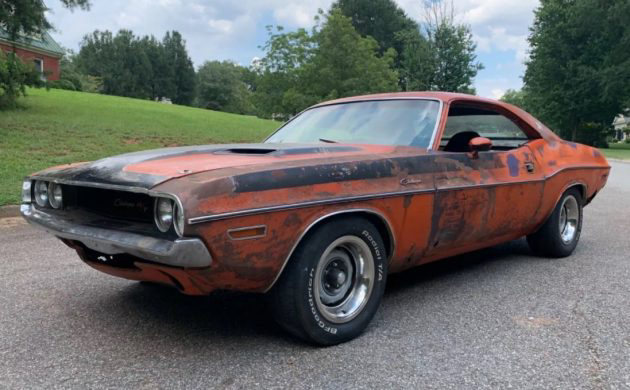
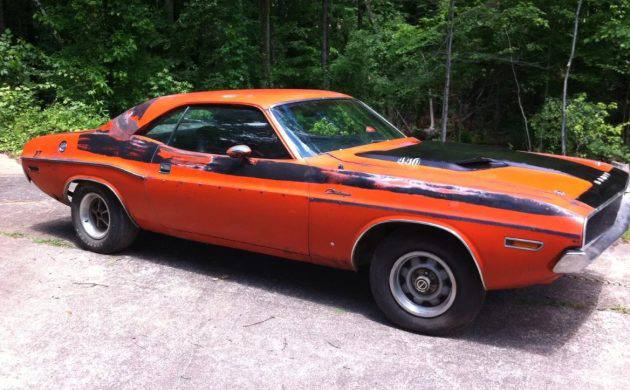
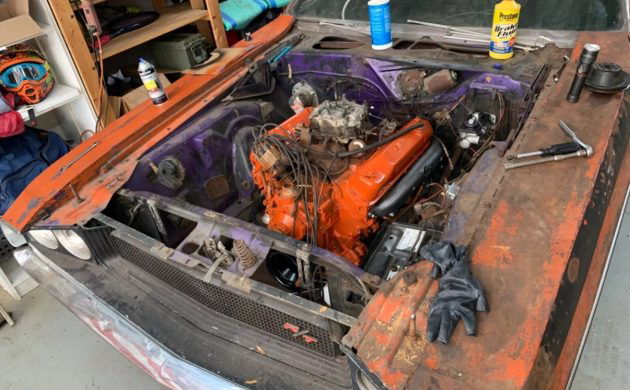
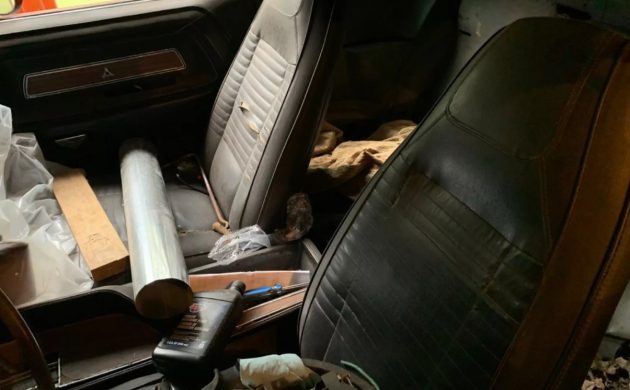
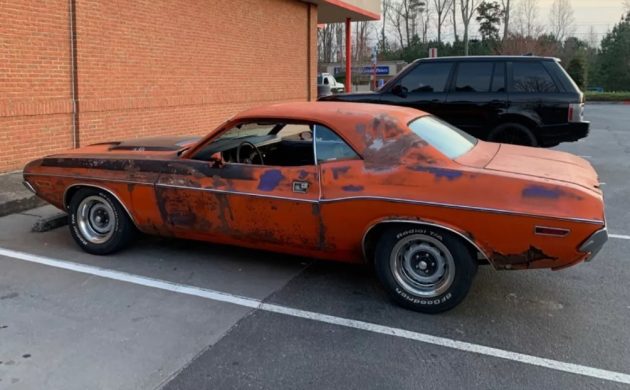





I think it came from the factory with a 383, from what I could see the trim tag says, JS23 N. A 440 Magnum should be U. The seller should have made its clear. The lack of specifics and a too few pictures will hold back bidding, rightfully so.
Steve R
I think someone was “plum crazy” to paint over that funky, purple paint job.
This is a 383 4bbl car originally. Evidenced as Steve R said by the fifth digit N in the vin and the E63 code on the fender tag in the lower left corner. E86 = 440 4 bbl (E87 = 440 6bbl).
Be fun to just repair the rust and ensure it’s mechanically sound and drive it. Probably get more attention as a natural patina’d bucket rather than a restored one or a poser with fake or exaggerated patina.
R/T rough n tumbler.
I love it! You know, these spoiled brats at auction spending military budgets for small countries on cars like this that you could eat off the air cleaner, would be horrified to know, 97% of those cars turned into exactly this. There was nothing high and mighty about a musclecar in 1980, and these became rusty beaters, gotten cheap to offset the gas costs, and eventually, fell out of favor for 20 years.
Fast forward to today, these are the hottest of the hot buttons at auction, and owners of like vehicles, regardless of condition, want in. Can’t really blame them, enjoy it now, the end is near,,,for this kind of stuff. And that fabulous ’56 Packard, what now? $5100? Sheesh,,,
The Packard had a high bid of just under $10,000, not $5,100. It’s a dead brand, without much of a following, it’s also a 4 door. That’s the segment which will lead the market down and will likely compete on price against all of the other makes and models based on price going forward. This Challenger, along with most of the other cars that have been sought after since new will always maintain a huge premium. Their prices may go up and down, largely based on the economy, but there will always be a lineup of potential buyers when they come up for auction, regardless of the platform.
Steve R
We were buying these cars in 1979 for $1,000. I passed on a 69 Road Runner convertible. Vitamin C 4 speed factory air front disc’s Air Grabber ps pb AM/FM and more for $1,300 in western PA. Rusty but never hit. It was April 1979.
They left the engine bay purple!? Sacriligious!
Downright blasphemy!
Downright Blasphemy on that engine bay!